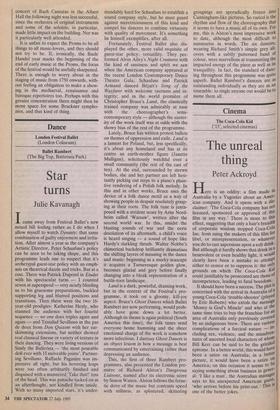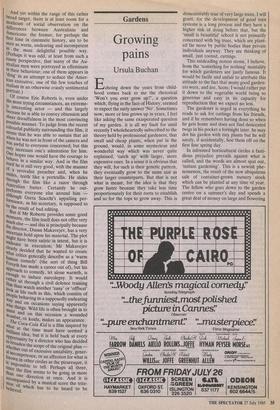Cinema
The Coca-Cola Kid ('15', selected cinemas)
The unreal thing
Peter Ackroyd
Here is an oddity: a film made in Australia by a Yugoslav about an Amer- ican company. And it opens with a dis" claimer: 'The Coca-Cola company has nOt licensed, sponsored or approved of th!s film in any way.' There is more to tin5 effect, suggesting that only a hair's breadth of corporafe wisdom stopped Coca-Cola Inc. from suing the makers of this film for libel, or misrepresentation, or whatever you do to cast aspersions upon a soft drink But although it hardly shows that drink UI3 benevolent or even healthy light, it would clearly have been a mistake to attemPt either to censor or to suppress it: the oniY grounds on which The Coca-Cola Kid could justifiably be prosecuted are those 0f incompetence, leading to fatal boredom.. It should have been a success. The plot Is concerned with the arrival in Australia of a young Coca-Cola `trouble-shooter' (played by Eric Roberts) who extols the message 'Money is God's Muscle' and who at the same time tries to buy the franchise for arl area of Australia only previously covered by an indigenous brew. There are various complications of a farcical nature — eluding sex, violence, and the misadveri. tures of assorted local characters of win3MA Bill Kerr can be said to be the grizzle" epitome. In a better world, this would have been a satire on Australia; in a better picture, it would have been a satire oil America; on this occasion it seems to be saying something about business in geoer: al: 'I like a man', the Australian manage' says to his unexpected American goes!' 'who arrives before his print-out.' This 15 one of the better jokes. And yet within the range of this rather broad target, there is at least room for a modicum of social observation on the differences between Australians and Americans: the former, for perhaps the first time in cinematic history, are to be seen as warm, endearing and incompetent in the most delightful possible way. (Perhaps it was odd, at least from such a sunny perspective, that many of the Au- stralian men were portrayed as effeminate in their behaviour; one of them appears in 'drag' in an attempt to seduce the Amer- ican executive, one of the few touches of realism in an otherwise crassly sentimental Portrait.) Of course Eric Roberts is, even under the most trying circumstances, an extreme- ly interesting actor — and this largely because he is able to convey obsession and Sheer dreadfulness in the most convincing Possible manner. To judge from the recent Colourful publicity surrounding this film, it seems that he was able to sustain that air When he was not in front of the camera and was awful to everyone concerned; but this n increases one's admiration for him. behave hopes one would have the courage to oehave in a similar way. And in the film itself he is still very good, with the manner Of a revivalist preacher and, when he smiles, teeth like a portcullis. He slides through the film like a razor through Australian butter. Certainly he out- Performs everyone else around him — ,althongh Greta Scacchi's appalling per- tormance, as his secretary, is supposed to be the result of bad editing. But if Mr Roberts provides some good Moments, the film itself does not offer very Much else — and this is principally because the director, Dusan Makavejev, has a very uncertain hold upon his material. The plot :_lhight have been satiric in intent, but it is iuclloate in execution; Mr Makavejev Clearly decided that he wanted to create what critics generally describe as a 'warm human comedy' (the sort of thing Bill p °rsYth has made a career out of), but his approach to comedy, let alone warmth, is enough to induce narcolepsy. It would rather sit through a civil defence training fitrti than watch another 'zany' or 'offbeat' ook at life such as this, which consists of Pe_ oPle behaving in a supposedly endearing way and on occasions saying apparently wise things. Wild life is often brought in to ,.assist and on this occasion a wounded wombat, or koala, makes an appearance. The Coca-Cola Kid is a film inspired by kwunt at the time must have seemed a brilliant idea, but it is held back at every .°P_ Portunity by a director who has decided Whether out the scope of the original plan — ,avitiether out of excessive amiability, genet- L.2ncompetence, or an affection for what is • i.vn in other circles as the picaresque, it impossible to tell. Perhaps all three, Zee the film seems to be going in more one direction at once. And it is accompanied by a musical score the trite- SS of which has to be heard to be neved.















































 Previous page
Previous page